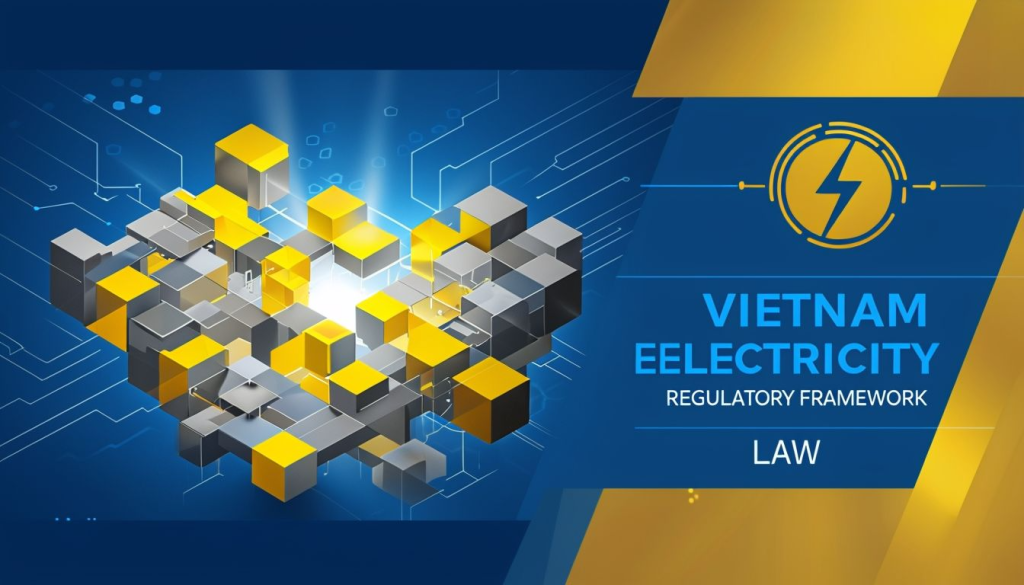Effective February 1, 2025, Vietnam’s energy sector will enter a transformative phase with the implementation of the new Electricity Law. This comprehensive reform replaces the nearly two-decade-old legislation, addressing challenges and creating a robust legal framework to promote clean energy development and a competitive energy market.
Approved by the National Assembly on November 30, 2024, the law aims to establish a unified, transparent, and investment-friendly electricity market.
Overview of Vietnam’s New Electricity Law
The 2024 Electricity Law applies to individuals and entities involved in Vietnam’s electricity sector, encompassing six key areas:
- Power Planning and Development
- Renewable and New Energy Sources
- Licensing and Revocation for Electricity Operations
- Electricity Trading Activities
- System Management and Operation
- Safety Standards for Electricity Use and Hydropower Dams
The law clarifies its precedence over other laws in case of conflicts, ensuring the smooth application of the new regulations.
Rules of Application and Transition Provisions
The new law establishes clear rules for cases where its provisions conflict with earlier laws. For example:
- It overrides older laws on approving power project investment policies and offshore wind power development.
- Laws enacted after February 1, 2025, must specify their interaction with the new Electricity Law.
Transition provisions ensure minimal disruption:
- Existing electricity investment projects and contracts before February 1, 2025, will continue under the 2004 law, with transitional bidding and competitive market amendments as needed.
- Licenses issued before the new law’s effective date remain valid while pending applications will be processed under the old law.
Certain power grid projects with voltage levels up to 220 kV crossing multiple provinces will continue under the Investment Law of 2020.
Key Provisions from the 2024 Electricity Law
Reforming Retail Electricity Pricing
The law introduces a multi-component pricing system, moving away from cross-subsidies that burden households. The Ministry of Industry and Trade (MOIT) will develop a phased roadmap to implement this system, ensuring price flexibility and alignment with renewable energy adoption.
Incentivizing Renewable Energy Development
The law establishes a framework to encourage renewable energy sources, including solar, wind, nuclear power, green hydrogen, and green ammonia. It includes:
- Incentives for offshore wind power and small hydropower projects.
- Preferential policies for competitive electricity market investments.
- Direct Power Purchase Agreements (DPPAs), allow renewable projects to bypass traditional bidding processes, ensuring alignment with market regulations.
Special Mechanisms for Offshore Wind Power
Offshore wind projects benefit from:
- Direct appointment mechanisms.
- Minimum electricity output requirements in PPAs.
- Reduced financial obligations for land and sea leases.
Share transfers in offshore projects are now permissible, with specific guidance to follow.
Urgent Energy Projects
Streamlined procedures for urgent energy projects enable fast-tracked investment approvals and construction, including simplified land-use conversions. Investors gain autonomy in decision-making during construction while remaining responsible for quality assurance and project records.
Liquefied Natural Gas (LNG) Energy Development
The law clarifies minimum electricity output concepts, supporting take-or-pay mechanisms and fuel pass-through arrangements in Power Purchase Agreements (PPAs) for LNG projects. These measures aim to attract investment and bolster domestic LNG power development.
Strengthening the Competitive Electricity Market
The revised law promotes competition by:
- Establishing a competitive electricity trading market with mechanisms for term contracts, electricity futures, and purchase options contracts.
- Regulating connections between Vietnam’s electricity grid and foreign power systems.
- Introducing clear bidding processes for investor selection in electricity projects.
Emerging Opportunities in Energy Storage and Nuclear Power
To complement renewable energy adoption, the law incentivizes private investment in energy storage systems. It also outlines policies to revitalize Vietnam’s nuclear energy sector, with a focus on amending the 2008 Law on Nuclear Power for a stronger legal framework.
Vietnam’s new Electricity Law marks a pivotal moment in the country’s energy transition. By addressing long-standing challenges, fostering renewable energy, and creating a competitive electricity market, the law paves the way for a sustainable and transparent energy sector. However, detailed government regulations are essential for the effective implementation of this ambitious reform.
ASL Law is a leading full-service and independent Vietnamese law firm made up of experienced and talented lawyers. ASL Law is ranked as the top tier Law Firm in Vietnam by Legal500, Asia Law, WTR, and Asia Business Law Journal. Based in both Hanoi and Ho Chi Minh City in Vietnam, the firm’s main purpose is to provide the most practical, efficient, and lawful advice to its domestic and international clients. If we can be of assistance, please email to [email protected].
ASL LAW is a top-tier Vietnamese law firm that provides in-depth legal advice in Vietnam and internationally. If you need any advice, don’t hesitate to get in touch with us for further information or collaboration.

 Tiếng Việt
Tiếng Việt 中文 (中国)
中文 (中国) 日本語
日本語

